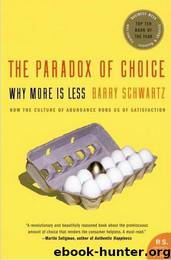The Paradox of Choice: Why More Is Less by Barry Schwartz

Author:Barry Schwartz
Language: eng
Format: mobi
Tags: Decision-Making & Problem Solving, Decision-Making, General, Decision Making, Education, Choice (Psychology), Business & Economics
ISBN: 9780060005696
Publisher: HarperCollins
Published: 2004-01-01T23:00:00+00:00
CHAPTER SEVEN
“If Only…”: The Problem of Regret
ANYTIME YOU MAKE A DECISION AND IT DOESN’T TURN OUT WELL or you find an alternative that would have turned out better, you’re a candidate for regret.
Several months ago my wife and I ordered a high-tech, great-for the-back desk chair in an on-line auction on eBay. The chair never appeared, the seller was a fraud, and we (along with several others) lost a tidy sum of money. “How could we have been so stupid?” my wife and I have taken turns saying to each other. Do we regret having been taken? Indeed we do.
This is postdecision regret, regret that occurs after we’ve experienced the results of a decision. But there is also something called anticipated regret, which rears its head even before a decision is made. How will it feel to buy this sweater only to find a nicer, cheaper one in the next store? How will it feel if I take this job only to have a better opportunity appear next week?
Postdecision regret is sometimes referred to as “buyer’s remorse.” After a purchasing decision, we start to have second thoughts, convincing ourselves that rejected alternatives were actually better than the one we chose, or imagining that there are better alternatives out there that we haven’t yet explored. The bitter taste of regret detracts from the satisfaction we get, whether or not the regret is justified. Anticipated regret is in many ways worse, because it will produce not just dissatisfaction but paralysis. If someone asks herself how it would feel to buy this house only to discover a better one next week, she probably won’t buy this house.
Both types of regret—anticipated and postdecision—will raise the emotional stakes of decisions. Anticipated regret will make decisions harder to make, and postdecision regret will make them harder to enjoy.
Individuals are not all equally susceptible to regret. Recall that when my colleagues and I measured individual differences in regret, we found that people with high regret scores are less happy, less satisfied with life, less optimistic, and more depressed than those with low regret scores. We also found that people with high regret scores tend to be maximizers. Indeed, we think that concern about regret is a major reason that individuals are maximizers. The only way to be sure that you won’t regret a decision is by making the best possible decision. So regret doesn’t seem to serve people well psychologically. And once again, the more options you have, the more likely it is that you will experience regret, either in anticipation of decisions or after them. Which may be a major reason why adding choices to our lives doesn’t always make us better off.
Even though there are differences among individuals in sensitivity to regret, some circumstances are more likely to trigger regret than others.
Omission Bias
ONE STUDY OF REGRET HAD PARTICIPANTS READ THE FOLLOWING:
Mr. Paul owns shares in Company A. During the past year he considered switching to stock in Company B, but he decided against it. He
Download
This site does not store any files on its server. We only index and link to content provided by other sites. Please contact the content providers to delete copyright contents if any and email us, we'll remove relevant links or contents immediately.
Hit Refresh by Satya Nadella(9132)
The Compound Effect by Darren Hardy(8965)
Change Your Questions, Change Your Life by Marilee Adams(7780)
Nudge - Improving Decisions about Health, Wealth, and Happiness by Thaler Sunstein(7706)
The Black Swan by Nassim Nicholas Taleb(7129)
Deep Work by Cal Newport(7083)
Rich Dad Poor Dad by Robert T. Kiyosaki(6632)
Daring Greatly by Brene Brown(6512)
Principles: Life and Work by Ray Dalio(6446)
Playing to Win_ How Strategy Really Works by A.G. Lafley & Roger L. Martin(6303)
Man-made Catastrophes and Risk Information Concealment by Dmitry Chernov & Didier Sornette(6019)
Big Magic: Creative Living Beyond Fear by Elizabeth Gilbert(5771)
Digital Minimalism by Cal Newport;(5764)
The Myth of the Strong Leader by Archie Brown(5507)
The Slight Edge by Jeff Olson(5417)
Discipline Equals Freedom by Jocko Willink(5389)
The Motivation Myth by Jeff Haden(5212)
The Laws of Human Nature by Robert Greene(5208)
Stone's Rules by Roger Stone(5087)
